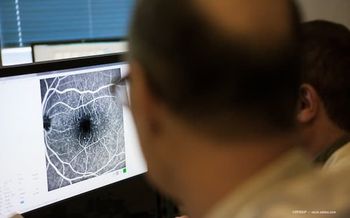
Questions in Ophthalmology: What do you wish patients knew about eye health?
Experts in the field weigh in on and give opinions on the question "What do you wish patients knew about eye health."
Our team spoke with several researchers and industry professionals at the 2023 American Society of Retina Specialists meeting in Seattle, Washington. We asked, "What do you wish patients knew about eye health?" Here's what Veena Raiji, MD, MPH, Dante Pieramici, MD, Ursula Schmidt-Erfurth, MD, and Michael Singer, MD, had to say!
Video Transcript
Veena Raiji, MD, MPH: I think the most important thing is for patients to understand the need for screening for several conditions that can cause irreversible blindness, specifically diabetes and glaucoma. I think it behooves us all to counsel our patients and their family members so that they understand the importance of screening and the potential for irreversible vision loss.
Dante Pieramici, MD: Well, I think, I think that patients need to realize, particularly patients that have diabetic disease, need to realize that there's a lot we can do to treat these diseases and there's, and that they very well may not have visual symptoms or significant visual symptoms, but still could potentially have significant retinal diseases. So ,it's important, particularly as you get older, to be have regular eye exams, regular dilated eye exams, because if we can pick up this disease processes early on and treat them, we're going to end up with much better visual results in the, in the long run.
Ursula Schmidt-Erfurth, MD: I think that patients should understand that the retina is unforgiving, and the damage that has already occurred is hardly reversible. And that means that you have to have your regular eye checks. I think that opticians and optometrists should be involved in this screening process, and patients should be aware of it. And patients should also become more active. They should feel like partners in the treatment. They should ask for evidence. They should ask for reports that visualize the disease and that makes the patient more engaged, and compliance would certainly improve as well.
Michael Singer, MD: I think patients could, if patients knew more about the fact that compliance is really a determining factor in how they're going to see long term. I think early detection, increased compliance, and controlling their overall health. I think they'd ended up being in better shape than they would be given the fact that right now there are lots of missed visits, lots of disappointed patients.
Newsletter
Keep your retina practice on the forefront—subscribe for expert analysis and emerging trends in retinal disease management.




























